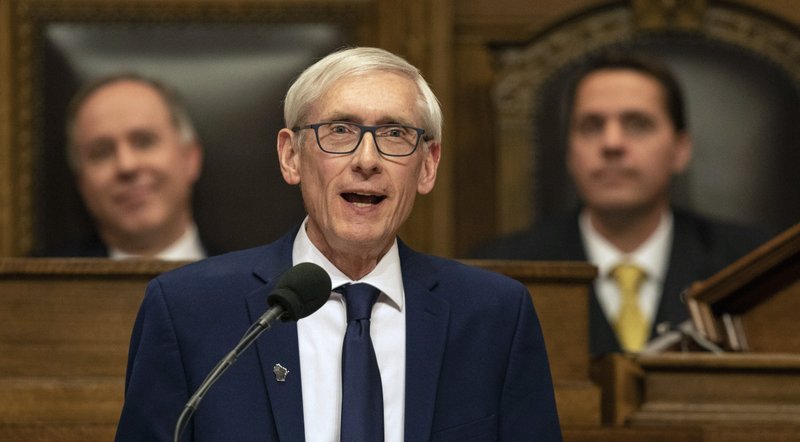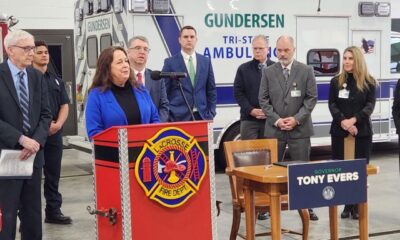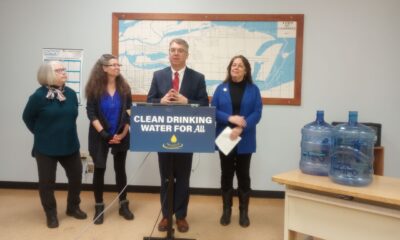Wisconsin
Evers promises clean drinking water; what now?

MADISON, Wis. (AP) — Democratic Gov. Tony Evers pledged to clean up Wisconsin’s drinking water in his State of the State address, promising to work to replace lead pipes across the state and improve well water quality during what he dubbed the year of clean drinking water. Here’s a look at the extent of pollution in Wisconsin, how lawmakers are dealing with it and Evers’ promise:
WHAT’S THE PROBLEM?
It’s twofold, starting with private well contamination. A survey conducted by county health departments between 2007 and 2010 found that 47 percent of nearly 4,000 wells used by low-income families with pregnant women or young children had levels of contaminants that exceeded water quality standards. The contaminants included nitrates, which come from fertilizer and manure and have been linked to adverse health effects, including thyroid disease.
A November survey by the Wisconsin Geological and Natural History Survey, the U.S. Department of Agriculture and the U.S. Geological Survey found 42 percent of 301 randomly selected wells in Iowa, Grant and LaFayette counties exceed federal standards for bacteria.
A third of the wells in Kewaunee County tested in 2015 had unsafe levels of nitrates and bacteria. The La Crosse County Health Department warned 2,000 households last spring that their wells could be contaminated with nitrates.
Meanwhile, at least 176,000 Wisconsin homes and businesses get water through lead service lines. More than half of those pipes are in Milwaukee. Lead from the lines can flake off into water and cause permanent brain damage in young children. Replacing a single line can cost thousands of dollars.
WHAT’S CAUSING WELL CONTAMINATION?
Polluted well water has been an issue in Wisconsin for decades, according to Kevin Masarik, a groundwater specialist with the University of Wisconsin-Stevens Point and UW-Extension. Some areas of the state, such as eastern Wisconsin, have thin top soil and porous bedrock, which allows runoff from manure and fertilizer to more easily seep into groundwater. Agriculture has been expanding, turning forest and grassland into farm fields and some farms may not have enough land to disperse manure evenly, Masarik said. Some groundwater contamination has been traced to faulty septic systems, too.
ARE LEGISLATORS AND OTHER STATE OFFICIALS DOING ANYTHING ABOUT IT?
Yes.
The state Department of Natural Resources adopted contentious restrictions on manure spreading in 15 eastern Wisconsin counties, including Kewaunee, last year. The limits vary according to the depth of each farm’s topsoil and carve out zones around wells where manure can’t be spread. Factory farms won’t have to comply with them for years, however. The restrictions won’t be imposed until they renew their permits, which last five years.
Former Gov. Scott Walker signed a bill from Sen. Rob Cowles last year that allows public utilities to provide grants and loans to customers to replace lead pipes. Municipalities must pass ordinances allowing utilities to provide the money and utilities must get approval from the state Public Service Commission, however. So far only Kenosha’s water utility has been approved, according to the PSC. Manitowoc and Menasha have applied for commission approval.
Assembly Speaker Robin Vos announced earlier this month he will create a task force to study water quality issues at the request of Republican Reps. Travis Tranel of Cuba City and Todd Novak of Dodgeville. They represent portions of Iowa, LaFayette and Grant counties.
WHAT DID EVERS PROMISE?
The new Democratic governor called 2019 the year of clean drinking water in his State of the State speech Tuesday . He cited the 2013 DHS study that found 47 percent of tested wells didn’t meet health standards. He also mentioned the 176,000 lead pipes, saying it could cost more than $2 billion to remove them.
He pledged to sign an executive order to designate someone at DHS “to take charge on addressing Wisconsin’s lead crisis and to help secure federal funding for prevention and treatment programs.”
He didn’t elaborate and he didn’t say what plans, if any, he has in store to alleviate well pollution. His spokeswoman, Melissa Baldauff, didn’t respond to emails and a voicemail seeking more details.
WHAT’S THE REPUBLICAN REACTION?
Guarded. Evers’ water remarks did draw Republican applause but it was tepid compared with Democrats’ standing ovations. Novak said he was glad Evers mentioned water pollution in his speech but he doesn’t know what to expect since Evers was short on specifics. He said Vos’ task force will watch what the governor does. Cowles said in an email that he was happy Evers and Vos want to work on cleaning up drinking water. He said he hopes both Evers and Vos will work with him on some “major water initiatives” he’s crafting, including a bill that would shift the full $345 annual factory farm water pollution permit fee to the DNR. Currently $95 goes to the agency for permit enforcement and $250 goes to the state general fund.
WHAT DO ENVIRONMENTALISTS THINK?
They’re ecstatic. Jennifer Giegerich, a lobbyist for the Wisconsin League of Conservation Voters, said her organization is “thrilled” with Evers’ year of clean drinking water declaration. Wisconsin has never had a governor that made removing lead pipes a priority, she said. She added that Evers should form his own water quality task force. Clean Wisconsin lobbyist Amber Meyer Smith said her group is excited to see Evers emphasize lead pipes and hopes that declaration will focus attention on all water pollution problems.
WHAT ABOUT FARMERS?
They’re waiting and watching. Karen Gefvert, a lobbyist for the Wisconsin Farm Bureau Federation, noted that the lead pipe issue is unrelated to well contamination but without any specifics from Evers it’s too early to comment. John Holevoet, a lobbyist for the Dairy Business Association, which opposed the manure spreading rules last year, didn’t immediately respond to voicemails. Wisconsin Manufacturers and Commerce, the state’s largest business group, also opposed the manure restrictions. WMC spokesman Nick Novak declined comment since Evers hasn’t offered any specific proposals.







